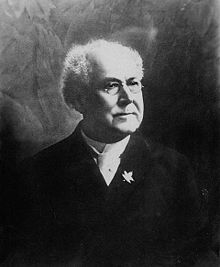Alexander Muir (5 April 1830 – 26 June 1906) was a Canadian songwriter, poet, soldier, and school headmaster.[1] He was the composer of "The Maple Leaf Forever", which he wrote in October 1867 to celebrate the Confederation of Canada.[2]
Alexander Muir | |
|---|---|
 | |
| Born | 5 April 1830 Lesmahagow, Scotland |
| Died | 26 June 1906 (aged 76) Toronto, Ontario, Canada |
| Alma mater | Queen's College |
| Occupation(s) | Songwriter, poet, school headmaster |
| Military career | |
| Allegiance | Canada |
| Service | Canadian Militia |
| Years of service | 1861–1867 |
| Rank | Private |
| Unit | 2nd Queen's Own Rifles |
| Battles / wars | Fenian raids |
Early life
editIn 1833 Muir immigrated to Toronto, Ontario, from Lesmahagow, Scotland, where he grew up and he was educated by his father. Muir later studied at Queen's College, where he graduated in 1851.[3]
Career
editMuir taught in the Greater Toronto Area in such places as Scarborough (School Section # 6 in what is now Woburn.[4]) and Toronto, as well as in Newmarket, Beaverton, and in then suburban areas as Parkdale and Leslieville, where he lived on Laing Avenue.
During the early 1870s, Alexander Muir was an elementary school teacher in Newmarket. When the cornerstone of the Christian Church in Newmarket was being laid on 25 June 1874, by the Governor General, Lord Dufferin, Muir brought his school choir to the event to sing his new composition "The Maple Leaf Forever", its first public performance.
From 1860 to 1870, he was principal of Leslieville School in Toronto. He was later (1888-1901) principal of Toronto's Alexander Muir/Gladstone Junior and Senior Public School (renamed after his death in his honour).
Muir was a noted Canadian Orangeman.[5] He joined The Queen's Own Rifles of Canada in 1860 and served as Lieutenant in No. 10 (Highland) Company, fighting with them at the Battle of Ridgeway being wounded in the arm. He was later awarded the Canada General Service Medal. He also wrote "The Maple Leaf Forever" while he was serving with the regiment.
Music
editAlthough Muir's musical activities were on an amateur level, they were strongly emphasized along with athletics and patriotism during his teaching career. Muir wrote several songs about Canada during his career, including "Canada Forever" and "Young Canada Was Here", but his most enduring composition was "The Maple Leaf Forever", written in 1867, the year of Confederation. Muir originally wrote the poem for a patriotic poetry contest in Montreal, winning second prize. He then looked for an existing melody that would fit, a very common practice (it was not unusual for a poem printed in a journal to bear the statement "May be sung to the tune of..."). When he failed to find a suitable tune, Muir wrote the music himself.[6]
Death and legacy
editMuir died unexpectedly in Toronto on June 26, 1906.[7] He was buried at Mount Pleasant Cemetery.
A number of places have been named in his honor:
- Alexander Muir Memorial Gardens, a formal garden and park, just south of Yonge Street and Lawrence Avenue in the Lawrence Park neighbourhood of Toronto, is named in his honour.
- Alexmuir Park, a small park on Alexmuir Boulevard in Scarborough and next to Alexmuir Junior Public School and St. Marguerite Bourgeoys Catholic School.
- Maple Leaf Forever Park is in the rear of Maple Cottage at 62 Laing Street, near Leslie Street and Queen Street East in Toronto.
- Schools which have been named after him are:
- Alexander Muir/Gladstone Ave Junior and Senior Public School, 108 Gladstone Ave., Toronto[8]
- Alexmuir Junior Public School, 95 Alexmuir Blvd., Scarborough[9]
- Alexander Muir Public School, 75 Ford Wilson Blvd., Newmarket[10]
- formerly Alex Muir Public School, 188 Kohler St., Sault Ste Marie[11] which has now been repurposed into a 16 unit apartment building.[12]
- Three maple leaf symbols were honored after him is affixed in the crest of Woburn Collegiate Institute.
- Mount Muir in Alberta/British Columbia is named for him.[13]
References
edit- ^ "Alexander Muir", The Canadian Encyclopedia
- ^ "(De)Constructing Nationalist Music History". Institute for Canadian Music Newsletter. Vol. 1, no. 1. January 2003. pp. 10–12. Archived from the original on 31 March 2009. Retrieved 10 November 2006.
- ^ Biography at Dictionary of Canadian Biography Online
- ^ "History of Woburn".
- ^ J. Paul Green (1994). "Muir, Alexander". Dictionary of Canadian Biography, vol. 13, University of Toronto/Université Laval, 2003. Retrieved 28 August 2016.
- ^ McGee, Timothy J. (1985). The Music of Canada. New York, NY: W.W. Norton. pp. 65. ISBN 0-393-02279-X.
- ^ Written at Toronto. "Maple Leaf's Author Dead". The Daily Telegraph. Kitchener, Ontario. 27 June 1906. p. 1. Retrieved 10 September 2024.
- ^ "Toronto District School Board: Alexander Muir/Gladstone Ave Junior and Senior Public School". Tdsb.on.ca. Retrieved 20 February 2014.[permanent dead link]
- ^ "Toronto District School Board: Alexmuir Junior Public School". Tdsb.on.ca. Archived from the original on 10 March 2012. Retrieved 20 February 2014.
- ^ "York Region District School Board: Alexander Muir P.S". Yrdsb.edu.on.ca. Archived from the original on 23 April 2008. Retrieved 20 February 2014.
- ^ "Algoma District School Board: Alex Muir Public School" (PDF). Archived from the original (PDF) on 3 October 2006. Retrieved 20 February 2014.
- ^ "Algoma District School Board: Urban Aboriginal Alternative High School". Adsb.on.ca. Archived from the original on 23 February 2014. Retrieved 20 February 2014.
- ^ "Mount Muir". cdnrockiesdatabases.ca. Retrieved 24 February 2009.
- Bibliography
- Muir, Alexander (1990), From Aberdeen to Ottawa in 1845: The diary of Alexander Muir, Aberdeen, Scotland: Aberdeen University Press, ISBN 978-0080379838
External links
edit- Media related to Alexander Muir at Wikimedia Commons
- The Maple Leaf Forever MP3
- The Maple Leaf Forever MIDI File
- The Maple Leaf Forever Johnson, Edward, 1878-1959
